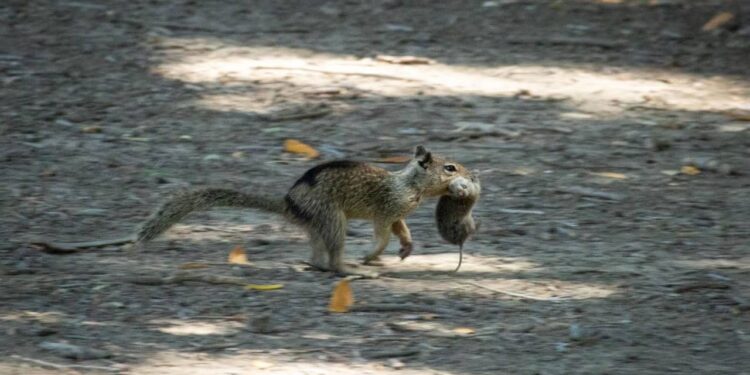Unveiling the Unexpected: California Ground Squirrels as Carnivores
Introduction
Commonly recognized for their seed-based diet, California ground squirrels have recently been redefined by scientists in Northern California as opportunistic hunters. A fascinating study conducted over the summer of 2024 has uncovered a previously unknown behavior in these familiar rodents—they actively hunt and consume voles.
A Groundbreaking Discovery at Briones Regional Park
Researchers at Briones Regional Park in Contra Costa County documented a striking 74 interactions between ground squirrels and California voles from June to July. Nearly half of these encounters (42%) involved purposeful hunting behaviors, marking a notable shift in understanding their ecological habits.
Jennifer E. Smith, a biologist from the University of Wisconsin-Eau Claire and the lead author of the study, expressed her astonishment: “This revelation is remarkable; we often take squirrels for granted as common garden visitors. Discovering such an unprecedented hunting behavior underscores how much there is still to explore regarding animal behaviors.”
Unanticipated Hunters
The unexpected findings arose during an ongoing twelve-year exploration into the ecology of California ground squirrels. Initially brought to attention by undergraduate researchers who shared footage showcasing squirrels pursuing voles, co-author Sonja Wild from UC Davis found it hard to believe until she witnessed this predatory behavior firsthand almost daily thereafter.
Crucially, this change corresponds with a surge in vole population—a situation noted by citizen scientists using platforms like iNaturalist—which likely triggered this newly observed carnivorous dynamic among ground squirrels. The research suggests that what was once thought to be purely granivorous habits may indeed reflect an adaptable omnivorous diet.
Adapting on the Fly: Opportunism Among Species
Such adaptability may enable California ground squirrels to thrive even amid rapidly transforming environments influenced by human activity. As Wild pointed out, “Their ability to adjust foraging strategies based on food availability could give them resilience within urbanized regions.”
Opportunistic feeding isn’t exclusive to squirrels; other species like raccoons and coyotes demonstrate similar behaviors, adjusting their diets based on environmental changes. However, discovering the extent of carnivory exhibited by these ground squirrels left researchers unexpectedly amazed—”It’s extraordinary that we documented such unheard-of behavior,” Smith added.
The implications extend beyond feeding practices alone—questions linger about how this predation might affect local ecosystems and if such behaviors are innate or socially learned among populations. Researchers plan further investigations next year into whether this hunting trend persists post-vole boom and how it impacts reproductive patterns within squirrel communities.
Ecological Significance & Future Directions
As keystone species within their ecosystems—providing essential prey for various predators including hawks and snakes—the dietary adaptations of California ground squirrels carry significant ecological consequences. Understanding these shifts helps clarify their influential role within broader food webs; success or failure here can resonate through many other species reliant on them for sustenance.
Moreover, this moment underscores vital aspects about scientific inquiry itself—the value inherent in direct observation versus pure reliance on technological advancements today’s science offers “While digital tools enrich research pursuits,” Smith affirmed, “nothing beats witnessing wildlife engagement firsthand since animals consistently surprise us.”
As it stands now—a picture depicting a quintessential nut-stuffing squirrel requires revision—a mental shift towards energetic hunts featuring sharp teeth gripping unwitting voles marks our refreshed perspective!
These findings have been published in The Journal of Ethology.






